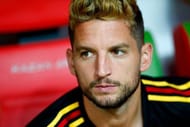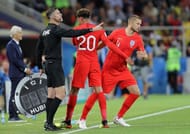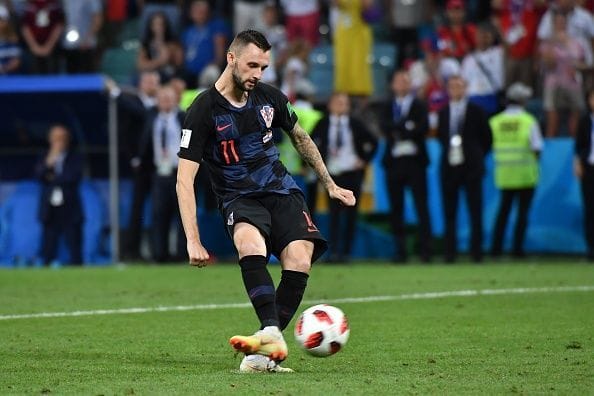And then there were four. After 60 games, 157 goals, 19 injury-time goals, 11 own goals, 3 red cards, 3 penalty shootouts, 28 eliminated teams and an umpteen amount of drama, the 2018 FIFA World Cup has come down to four teams: France, Belgium, England and Croatia.
At this point in the competition, every team needs to be at their best if they are to bring the trophy home (or football in England’s case). Yet none of these teams have done that yet- France’s attack still seems to lack teeth, Belgium almost lost to Japan, England struggled to defeat Tunisia and Croatia are only here because of two consecutive penalty-shootout wins. So what are some tactical changes that each manager can consider for the most important game of their lives?
France- Play a Proper Left ‘Winger’- Thomas Lemar
When one takes a look at the France squad, it is impossible not to see them as an offensive juggernaut containing the likes of Kylian Mbappe, Antoine Griezmann, Paul Pogba, Thomas Lemar and Ousmane Dembele. After all, this is a team that could afford to leave Anthony Martial, Alexandre Lacazette and (gulp) Karim Benzema at home. However, in reality, Didier Deschamps has made his side a defensively-sided team as Les Blues have only conceded four goals in the tournament.
In terms of their attack, they have actually struggled- only scoring eight goals up to this point. For comparison Belgium has scored 14, England has scored 11 and Croatia have scored 10. One reason for this is that Deschamps has decided to play an immobile and uncreative striker in Oliver Giroud instead of an additional winger like Lemar, Dembele or Nabil Fekir. However, Deschamps should continue this because his only alternative as a target man is Kylian Mbappe. The 19-year-old would be better served to wreak havoc against Nacer Chadli on the French right.
Instead what Deschamps can do is to play a proper left winger. So far the France manager has preferred to play natural central midfielders (Blaise Matuidi or Corentin Tolisso) in that role. While this provided defensive solidity, it has meant that France has relied on left-back Lucas Hernandez for any attacking production from that side.
Against Belgium, Deschamps can afford to play an out and out winger because Belgian wing-back Thomas Meunier is suspended. All alternatives for Meunier are likely to be defensively minded and thus the left midfielder will not need to defend much. Thus, France could use the attacking quality of someone like Thomas Lemar to break down the Belgian defense.
Belgium- Switch to a 4-2-3-1 with Dries Mertens

Before the quarter-finals, many were wary of how Roberto Martinez’s cavalier 3-4-2-1 formation would play against the attacking juggernaut that is Brazil. However, Martinez decided to make tactical changes against the Selecao by playing an additional defensive midfielder in Marouane Fellaini - freeing up Kevin De Bruyne (whose role was almost a false nine), Romelu Lukaku and Eden Hazard. The formation would be best described as an asymmetrical 4-3-3.
Yet, repeating the same formation against France would be a mistake. Les Blues are a great defensive team having only conceded one goal apart from the crazy Argentina Round of 16 games. In the 4-3-3 formation, Nacer Chadli was rather ineffectual as he struggled to fit in as a left-sided central midfielder. Instead, Chadli could be replaced by a proper attacker who might be more effective in breaking down the French defence. Thus, Belgium would be better off returning to one of their original starters: Dries Mertens. Mertens was among the best players in Serie A last season and was similarly effective for the Red Devils earlier in the tournament.
Switching to the 4-2-3-1 would also allow Kevin De Bruyne to function as a roving attacking midfielder, his ideal position (the false nine was ideal against a weaker defence like Brazil). It would also allow Romelu Lukaku to function in his natural role. His role as an inverted winger is effective against aging defenses, something that France certainly are not.
With Hazard and Mertens, Belgium might be defensively vulnerable against France’s fullbacks. However, this won’t be a problem considering Deschamps’s preferred full-backs Lucas Hernandez and Benjamin Pavard are not great offensively. In De Bruyne, Mertens, Lukaku and Hazard, Belgium has the most talented forwards in the tournament. If they use them properly, they could fulfill their potential.
England- Play Eric Dier instead of Dele Alli

After years of stale and unoriginal football by the English national team, Gareth Southgate has led a young dynamic English side to their first World Cup semi-final since 1990. Playing with a three-man defense, Southgate has managed to play three central midfielders in Jordan Henderson, Jesse Lingard, and Dele Alli. Henderson has provided solidity to the English midfield while Lingard has been the creative spark- scoring one wonder goal, earning a penalty and providing an assist to Alli in the last game.
Yet, the player that is almost redundant in this formation is Alli. While his goal was crucial against Sweden, Alli doesn’t contribute much in his central midfield role other than making runs into the box. He is an average passer for that position and does not help defensively. Against an overpowered central midfield with Luka Modric and Ivan Rakitic, England could do with another defensive midfielder.
They have the ideal player for that position in Alli’s Tottenham teammate Eric Dier. Dier is a defensive rock, having averaged 1.8 tackles, 1.4 interceptions and 2.4 clearances per game for Tottenham Hotspur in the Premier League last season. Dier is also a better passer than Alli with a pass success percentage of 86.3% compared to Alli’s 77.2%. Against Croatia’s brilliant midfield, Dier’s defensive work and passing will be crucial if the Three Lions are to reach their first final since 1966.
Croatia- Play Marcelo Brozovic

Very similarly to England, Croatia could do with an additional defensive midfielder. However, unlike England, playing Marcelo Brozovic would actually be an attacking change. In the quarter-finals against Russia, manager Zlatko Dalic perhaps got a little too complacent and decided to play striker Andrej Kramaric.
This was ineffective against Russia as both Luka Modric and Ivan Rakitic had to constantly drop back to prevent Russian counter-attacks. Without Brozovic, Croatia will be even more vulnerable to England whose attacking talent is fare better than that of the hosts. This would put even more defensive pressure on Modric and Rakitic, nullifying their playmaking ability.
Instead, Dalic should return to the team he played against Argentina and Denmark with Brozovic in defensive midfield. This formation has not only yielded more defensive solidity (Croatia only conceded one goal in those two games), but has also improved Croatia’s attack with Modric and Rakitic being more effective. In fact, Croatia have averaged 2.25 expected goals (a measure of the quality of chances being created) with Brozovic in the side compared to 1.53 without the midfielder. While Kramaric was effective against Russia (scoring a vital goal), Croatia would be served with him coming off the bench against the Three Lions.
